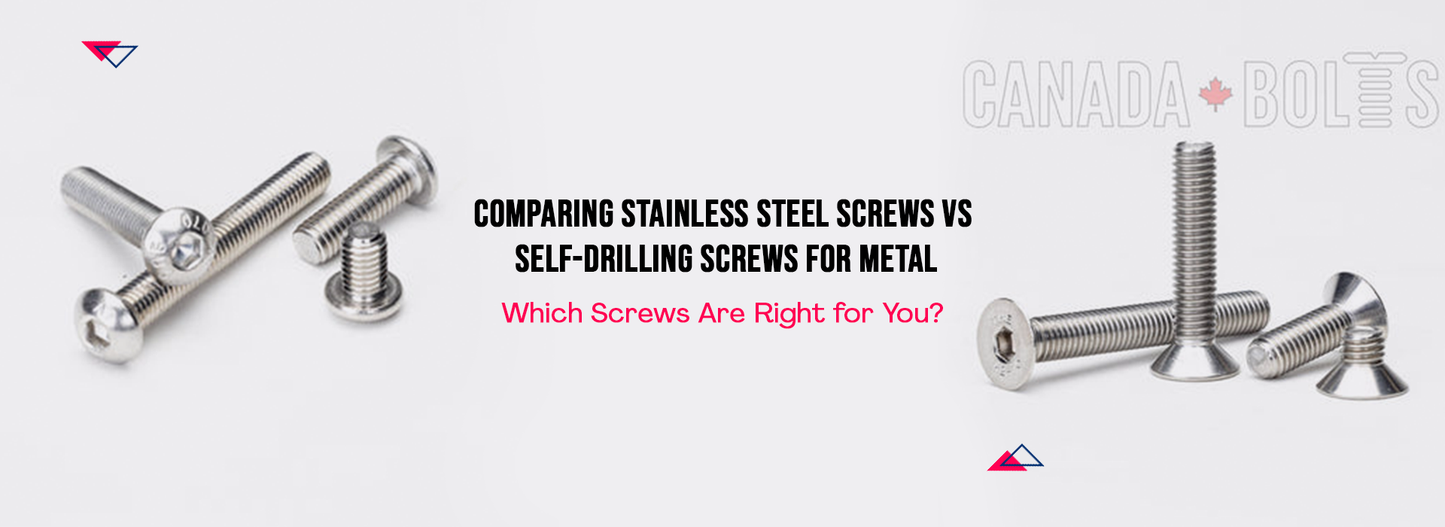
When working with metal, you have to choose the right screws for a successful project. They may make or break your project. Two of the most common screw options are stainless steel screws and self-drilling screws for metal. Each type of screw has its own specialty, which is suitable for specific applications and industries.
In this blog, we will take a look at what these screws are, how they differ, when to choose them, and tips you should know before choosing them.
What Are Stainless Steel Screws?
Stainless steel screws are fasteners made from an alloy. It is known for its resistance to rust and corrosion. They are mainly used for construction, marine, and outdoor projects, where there is exposure to moisture and saltwater. Stainless steel screws are durable and long-lasting. They can withstand harsh weather conditions without losing their strength. They are available in different styles, like Phillips head screws and more. They are easy to install with a firm grip for screwdrivers.
Common applications for stainless steel screws include:
- Outdoor furniture and decking
- Marine equipment
- Automotive assemblies
- Structural metal frameworks
If longevity and corrosion resistance are the top priorities of your project, stainless steel screws are the best choice.
What Are Self-Drilling Screws?
Self-drilling screws for metal are made with a drill-bit tip that removes the need to drill a pilot hole. They are time-saving screws and perfect for construction professionals or DIY enthusiasts. Unlike standard fasteners, these can cut through thin sheets and metal quickly and securely. They are also part of metal screws, self-tapping, which means they create their own thread as they are inserted. This feature ensures strong string fastening and reduces installation time.
Common uses for self-drilling screws include:
- Roofing and siding projects
- HVAC installations
- Sheet metal work
- Electrical enclosures
If you are working on a project that requires efficiency and speed, self-drilling screws for metal offer unmatched convenience.

Stainless Steel Screws vs Self-Drilling Screws: Key Differences
Although both screws are used to fasten metal, they are different:
Material and Durability
- Stainless steel is made with an alloy for corrosion resistance and is highly durable in marine and wet environments.
- Self-drilling screws are made from hardened steel with protective coatings. They are known for durability and are prone to wear.
Corrosion Resistance
- Stainless steel screws are known to resist rust, especially outdoors and in humid conditions.
- Self-drilling screws provide resistance, but they rely heavily on their ocatings, which may degrade over time.
Installation Process
- Stainless steel screws usually need a pilot hole unless you are using a self-tapping version. For example, Phillips head screws are easy to drive in.
- Self-drilling screws for metal have a drill-tip design that removes the need for pre-drilling, which saves time.
Strength and Holding Power
- Stainless steel screws are strong and reliable for long-term use, even under load and stress.
- Self-drilling screws are strong for sheet metal applications, but they are for speedy work and convenience rather than heavy-duty support.
Applications
- Stainless steel is ideal for outdoor projects, marine use, and environments with high exposure to moisture.
- Self-drilling screws work well for roofing, siding, and quick construction tasks where efficiency is essential.
Cost
- Stainless steel screws are more expensive because of their material quality.
- Self-drilling screws are more affordable and practical for large-scale projects.

When to Use Stainless Steel Screws?
Use stainless steel screws when:
- You have a project for outdoors or exposed to moisture.
- Long-term durability and corrosion resistance are more important.
- You need reliable fastening in high-stress or marine environments.
- You prefer versatile options like Phillips head screws for easy handling.
When to Use Self-Drilling Screws?
Choose self-drilling screws for metal when:
- You’re working with sheet metal or roofing.
- You need speed and efficiency in your project more than corrosion resistance.
- You want to avoid pre-drilling pilot holes.
- Your project involves metal screws, self-tapping for fast and secure fastening.
Tips for Choosing the Right Screw
When you are deciding between stainless steel screws and self-drilling scsrews for metal, consider these tips:
- Think about the environment: If the project is outdoors, in salt water, or in humid environments. Stainless screws are the most reliable.
- Time and efficiency: If you are working on a construction project, speed is important, so choosing self-drilling screws is a better choice.
- Cost vs durability: Stainless steel screws are high in cost but offer longevity. Self-drilling screws are more budget-friendly and efficient for big tasks.
- Match the screw with the material: Stainless steel works well with mixed materials or structured applications. Self-drilling screws are perfect for sheet metal roofing.
Conclusion
Stainless steel screws and self-drilling screws for metal are very different. Stainless steel is perfect for projects that demand corrosion resistance and long-term durability. It is also perfect for outdoors and marine environments. On the other hand, self-drilling screws are perfect for fast and efficient metal-to-metal applications where speedy installation is essential. The right choice depends on your priorities. So if you are looking to buy screws for your next project, check Canada Bolts. We not only have screws but also various other fasteners for your project.
